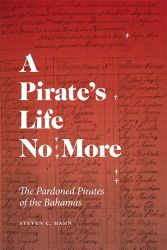 Pirates and Privateers Pirates and Privateers
The History of Maritime
Piracy
Cindy Vallar, Editor
& Reviewer
P.O. Box 425,
Keller, TX 76244-0425
    
Biography:
Pirates, Privateers, & Pirate Hunters

A Pirate’s Life No More: The Pardoned
Pirates of the Bahamas
by Steven C. Hahn
University of Georgia, 2025, ISBN 978-0-8203-7344-7,
US $32.95
Available in various formats
    
Before
Woodes Rogers arrived to eradicate piracy in the
Bahamas and take up his mantle as governor of the
island, another man sailed into Nassau’s harbor in
1718. Captain Vincent Pearse of the Royal Navy
carried with him King George’s Act of Grace in
search of those “young, resolute, [and] wicked
fellows” who wished to be pardoned for their crimes
and rejoin society. (1) Benjamin Hornigold was one
of the first to surrender; the notorious pirate
captain turned pirate hunter until his demise at
sea. He was a well-known scoundrel, but the majority
of the other 208 pirates were simply names on a
list.
While perusing Pearse’s three-page, handwritten
document at Britain’s National Archives at Kew, Hahn
wonders who these men are. How do they become
pirates and what happens to them after they are
pardoned? This book contains the stories of about
150 men, a third of whom remain in the Bahamas after
receiving their absolution. Others return to their
hometowns or start life anew in other colonies.
William Smith, for example, spends many years at sea
and becomes a successful merchant. Two of his
descendants later marry into the family of a man who
is elected President of the United States. Peter
Goudet serves as Bahamas’ customs collector, as well
as in the legislature. Other reformed pirates
succumb soon after their surrenders. Hahn also
delves into Pearse’s story and discovers some
interesting details that suggest his relations with
pirates aren’t as impartial as history leads us to
believe. Even some of those included in his list are
guilty by association rather than being pirates
themselves.
A Pirate’s Life No More is part of the
University of Georgia Press’s Early American Places
series. In addition to a bibliography, notes, and an
index, Hahn includes several illustrations, a table,
maps, and an appendix of Pearse’s List of Pardoned
Pirates. This last item provides brief biographical
summaries of the pirates. If he was unable to locate
additional information, only the pirate’s name is
listed.
This volume shines a fascinating and unique
spotlight on pirate history. Although primarily
about the individuals whom Hahn traced, he also puts
the time and places into historical perspective,
such as why the Bahamas is more conducive to being a
safe refuge for pirates and why events off the
Florida coast give rise to their proliferation.
Their rehabilitation is also explored – whether they
return to their homes in New York, New England, or
London, or choose to put down roots elsewhere.
Placing these men in context makes their stories
richer and more dynamic. Equally interesting are the
answers to questions that crop up as a result of
King George’s clemency, such as can the pirates keep
their ill-gotten earnings, and does the forgiveness
occur overnight. Aside from a brief period in their
lives, these lesser-known pirates live ordinary
lives, and Hahn has crafted a stellar addition to
any piratical or maritime history collection.
Review Copyright ©2025 Cindy Vallar

Click to contact me
Background image compliments
of Anke's Graphics |

